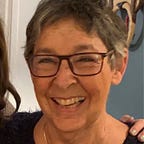The Importance of Condolences
Let the mourner know you care about their pain
This is my Jewish Cultural Society Rosh Hashanah remarks given September 2008, following my mother’s death.
This year’s remarks are different than those I’ve given in past years. I’m not going to give a lesson on some Jewish precept appropriate to the season but feel free to take what I say and examine your actions against it and resolve, if you think it’s necessary, to do differently in the coming year.
As many of you know, I lost my mother unexpectedly this past December. It was, and still is, the most difficult, sad and overwhelming event of my life. My purpose tonight isn’t to rehash those terrible days, but to talk to you about community, about doing what needs to be done to help those who need you, and to thank you for doing all of those things for me and my family in the days and weeks following her death.
My mother lived and died in New York, so the funeral and shiva were there. While my immediate family was around me to help comfort me, they were also mourning and had their own sad burdens to endure. My brother, at whose home shiva was held, had all of his friends present — many of whom I have known since childhood. Even so, for the several days that we sat, I admit to being overwhelmed and lonely in my grief even though there were so many people around. It occurred to me that it wasn’t just my sadness that was overwhelming, but the fact that I had none of my friends near me to comfort and hug me when I needed most to be comforted and hugged. My life and my friends are here in Michigan and it was hard to be away from all of you at that most difficult time. Many of you called me while I was in New York and when I returned home there were more phone calls on my answering machine. I appreciated then, and continue to appreciate now, your support and kindnesses. I received calls, condolence cards and emails from so many of you — your sympathy and wishes for loving memories and peace of mind and heart helped to sustain me.
JG (our Madrikha — the congregation leader) and I talked about how much I missed by not being able to be comforted in my grief by my friends. We decided to hold a memorial service for my mom about a month after her death. Many of you attended that service and the JCS Caring Community prepared a lovely kiddush. Again, your kindness in words and actions comforted and warmed me.
Through all of this, I realized several things. First, I realized that my secular philosophy CAN sustain me through the most difficult times. JG came to New York to conduct my mother’s funeral and while there was no talk of God or heaven in the service, there wasn’t one person who thought the funeral was lacking for anything comforting. It’s said that there are no atheists in foxholes, but I know that that isn’t true. I didn’t need a supernatural being or the promise of heaven for my mother to help me deal with my grief. I know that heaven is in my heart — with memories of my mom.
Second, I realized that condolences are important. The 12th-century sage Moses Maimonides wrote that by comforting mourners, a Jew can fulfill the mitzvah (blessing) “You shall love your neighbor as yourself.” More generally, comforting mourners is a way of showing concern for those in distress, showing them that they are neither abandoned nor alone. It seems a simple thing, but in the past, I have purchased sympathy cards and never mailed them for lack of a stamp or simply forgetfulness. But these cards and a brief caring message show the grieving family that you have taken time to think of them. Please don’t ever think that this small effort isn’t greatly appreciated. Weeks after we returned from New York cards continued to arrive — little gestures that reminded me that you cared about my loss. For me, consolation came in the form of your cards and calls.
As Secular Jews, we get our comfort from community rather than God, so difficult as it may be, talk to the mourning family about their loved one — or allow them to talk. Sharing loving memories with others is very healing and it may even produce a chuckle or two along the way. The traditional Jewish expression of condolence is “May you be consoled among the other mourners of Zion and Jerusalem.” In other words, you aren’t alone in your grief, others share your pain. While everyone feels their grief differently and no two people mourn the same way, those of you who lost parents provided me insights into my own grief and recovery.
Third, I realized that, since life can be taken so quickly, we must say the important things whenever we can. My father, just the day before my mother fell — the event that ultimately caused her death — told her that he loved her and she reciprocated. Of course, no one knew that that would be the last time it would be said, but how wonderful for her that she died with that thought in her head. And how wonderful for my father that he heard it from her. There is a line from the song “Do You Love Me?” from Fiddler on the Roof, after Tevye pesters Golde about whether she loves him, which brings this message home. “It doesn’t change a thing, but after 25 years, it’s nice to know.” Say nice things — it may not change a thing, but it’s nice to know.
